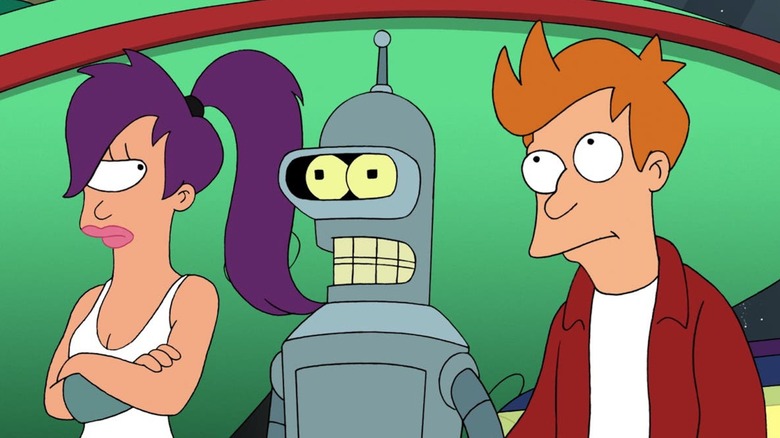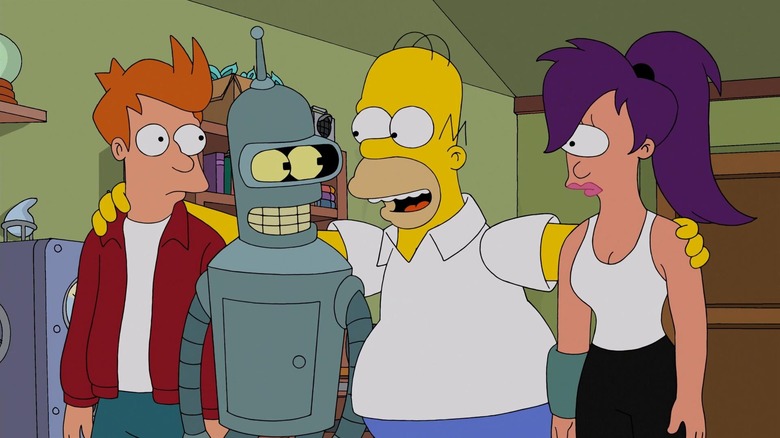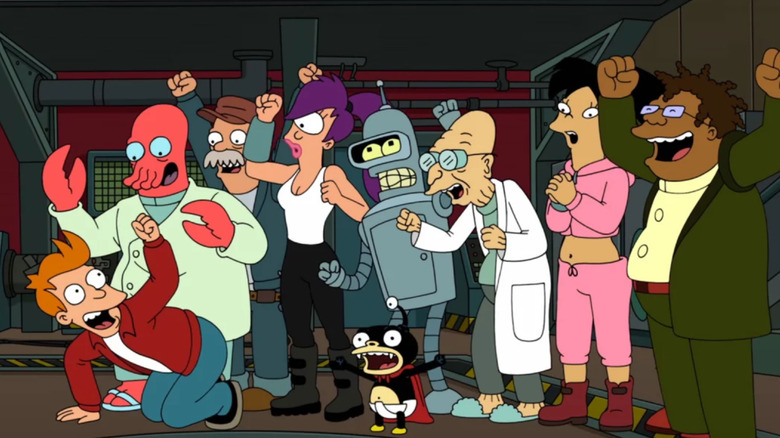Pitching Futurama To Fox Was A Grueling Process For Matt Groening
"Futurama: It just won't stay dead!" This was the caption on the title card of "Bender's Big Score," the first "Futurama" movie. Since that film's release in 2007, this has still proven true. Brief history lesson: "Futurama" aired for four seasons on Fox between 1999 and 2003. After its cancellation, fan outcry was loud enough for Comedy Central to produce four direct-to-DVD movies (later re-edited into a 16-episode season 5) between 2007 to 2009. Comedy Central then picked up the series for two more seasons, which aired from 2010 to 2013. After that second cancellation, it seemed the show was finally done for good, but it was recently announced that Hulu would be picking the show up for an eighth season.
The story of "Futurama" and its multiple revivals recalls "The Little Engine that Could." The series never had the ratings or cultural footprint of co-creator Matt Groening's "The Simpsons," or comparable adult animation like Seth MacFarlane's "Family Guy." The sci-fi theme of "Futurama" no doubt pushed it into a smaller niche than those other shows. Indeed, according to Groening, it was a struggle to even get the show on air in the first place.
The Simpsons' shadow
"The Simpsons and Their Mathematical Secrets" by Simon Singh touches on the creation of its subject sister series. "Futurama" was the child of not only Groening, but "Simpsons" writer David X. Cohen, who, as both a science and a science-fiction nerd, was the perfect fit to flesh out the series' setting and satirize tropes. Part of that satire lies within the setting; the world of "Futurama" is quite similar to our own, just with space ships and robots. If it leans more towards dystopia than utopia, that's only because modern day does too.
The "Simpsons" and "Futurama" share the same rapid-fire comic delivery and pop-culture flavored sense of humor, but their comic set-ups differ. While "The Simpsons" is a family sitcom, "Futurama" is a workplace sitcom, about the staff of a small delivery company. The twist? The show is set 1000 years in the future and the company is "Planet Express," which delivers across the universe.
On "The Simpsons," developer James L. Brooks had negotiated a sweet deal for the writers' room; Fox executives were barred from interfering with the show's production or altering its content. Despite "The Simpsons" ending up as one of Fox's biggest hits, the network was reticent to give Groening a similar deal on "Futurama."
Strange New World
In an interview with Mother Jones shortly before the "Futurama" premiere, Groening explained the trouble:
"The second they ordered it, they completely freaked out and were afraid the show was too dark and mean-spirited, and thought they had made a huge mistake and that the only way they could address their anxieties was to try to make me as crazy as possible with their frustrations."
Groening called the early production, "by far the worst experience of my grown-up life." In fairness to Fox, the humor of "Futurama" does have a definite mean streak. In the first episode, "Space Pilot 3000," Fry (Billy West) and Bender (John DiMaggio) meet after the former accidentally stumbles into a suicide booth. The show's cast was also all adults, unlike "The Simpsons" where more than half of the cast is elementary school aged kids. This meant "Futurama" would lack a child's POV "The Simpsons" often had and result in an older (and smaller) target audience.
Groening didn't give into network pressure though, "I resisted every step of the way. In one respect, I will take full blame for the show if it tanks, because I resisted every single bit of interference."
So, what marks does Groening deserve? "Futurama" definitely hasn't had the same consistent run as "The Simpsons," but despite its multiple cancellations, I wouldn't say it's fair to say the show "tanked" either. The series has had more second chances than any program in TV history, chances it wouldn't have gotten if it wasn't so darn good. While the Comedy Central seasons were definitely more uneven than the original run, they too had plenty good episodes ("Saturday Morning Fun Pit," "Murder of the Planet Express," and the until-recently series finale, "Meanwhile."). Fingers crossed that the Hulu revival lives up to this legacy and is a less draining experience for Groening, Cohen, and co.


